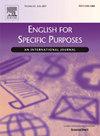Rhetorical distinctions: Comparing metadiscourse in essays by ChatGPT and students
IF 2.7
1区 文学
Q1 LINGUISTICS
引用次数: 0
Abstract
This study investigates the use of metadiscourse in argumentative essays generated by ChatGPT compared to those written by British university students. Using Hyland's (2005) framework, we analysed interactive and interactional metadiscourse to uncover rhetorical and linguistic distinctions. The findings reveal that ChatGPT essays, though structurally coherent and logically organised, exhibit a significantly lower frequency of interactional metadiscourse, such as hedges, boosters, and attitude markers, leading to a more impersonal and expository tone. Conversely, student essays demonstrate higher rhetorical engagement, employing nuanced stance markers and personalised expressions to foster reader interaction. ChatGPT prioritises clarity and structural coherence through transitions and endophoric markers, reflecting its algorithmic nature and training. The variability in student writing highlights the influence of individual style and instructional practices. These differences underscore the complementary roles of AI and human authorship in academic writing, with implications for pedagogy. This research advances our understanding of the rhetorical strategies employed by large language models and their potential in academic contexts.
修辞学上的区别:学生与ChatGPT作文中的元话语比较
本研究调查了ChatGPT生成的议论文中元话语的使用情况,并将其与英国大学生的议论文进行了比较。利用Hyland(2005)的框架,我们分析了互动元话语和互动元话语,以揭示修辞和语言的区别。研究结果显示,尽管ChatGPT的文章结构连贯、逻辑有序,但互动元话语(如限制语、助推器和态度标记)的使用频率明显较低,导致语气更加客观和说明文。相反,学生论文表现出更高的修辞参与度,使用细微的立场标记和个性化的表达来促进读者互动。ChatGPT通过过渡和内源性标记优先考虑清晰度和结构一致性,反映了其算法性质和训练。学生写作的可变性突出了个人风格和教学实践的影响。这些差异强调了人工智能和人类作者在学术写作中的互补作用,并对教育学产生影响。本研究促进了我们对大型语言模型所采用的修辞策略及其在学术语境中的潜力的理解。
本文章由计算机程序翻译,如有差异,请以英文原文为准。
求助全文
约1分钟内获得全文
求助全文
来源期刊

English for Specific Purposes
LINGUISTICS-
CiteScore
5.70
自引率
8.00%
发文量
41
审稿时长
62 days
期刊介绍:
English For Specific Purposes is an international peer-reviewed journal that welcomes submissions from across the world. Authors are encouraged to submit articles and research/discussion notes on topics relevant to the teaching and learning of discourse for specific communities: academic, occupational, or otherwise specialized. Topics such as the following may be treated from the perspective of English for specific purposes: second language acquisition in specialized contexts, needs assessment, curriculum development and evaluation, materials preparation, discourse analysis, descriptions of specialized varieties of English.
 求助内容:
求助内容: 应助结果提醒方式:
应助结果提醒方式:


